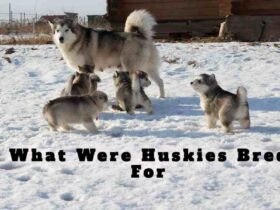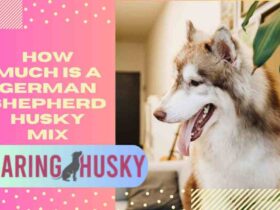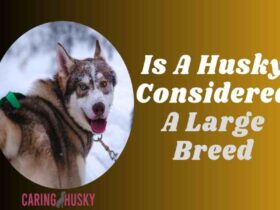When you first lay eyes on a Siberian Husky, it’s hard to deny the striking resemblance they bear to their wild counterparts, the wolves. With their piercing blue eyes, thick fur, and a demeanor that hints at a wild spirit, it’s no wonder that many people speculate about whether Huskies are wolf hybrids. However, appearances can be deceiving, and in the world of canine genetics, there’s more to the story than meets the eye. In this blog, we’ll dive deep into the question that has fascinated dog enthusiasts and curious minds alike: Is a Husky a wolf hybrid, or is there more to their story? Let’s explore the history, characteristics, and genetics behind these captivating dogs to uncover the truth.
Is a Husky a Wolf Hybrid?
No, a Husky is not a wolf hybrid. Huskies are a distinct breed of domesticated dog with their genetic lineage, despite their wolf-like appearance and some shared characteristics. DNA testing has confirmed that Huskies do not have significant wolf ancestry. The physical similarities between Huskies and wolves are due to convergent evolution, where unrelated species develop similar traits in response to similar environmental pressures. Huskies have a rich history as sled-pulling dogs in Siberia and should not be confused with wolf hybrids.
The Siberian Husky’s Origins
The Siberian Husky’s origins can be traced back to the remote and frigid Siberian region of Russia, where they were selectively bred by the indigenous Chukchi people. These resilient dogs were not only integral to the Chukchi’s way of life but also their survival in the harsh Arctic environment.
For thousands of years, the Chukchi people selectively bred Huskies for their remarkable qualities: strength, endurance, and adaptability to the extreme cold. These dogs played a crucial role in the Chukchi’s daily existence, serving as dependable companions and invaluable helpers in pulling sleds laden with supplies across vast, frozen expanses.
The Huskies’ endurance, loyalty, and ability to thrive in extreme conditions eventually captured the attention of outsiders. In the early 20th century, they were introduced to Alaska, where they gained recognition for their exceptional sled-pulling abilities. Today, Siberian Huskies continue to be cherished as loving companions and working dogs, with their enduring spirit paying homage to their remarkable heritage as Arctic adventurers.
Characteristics of the Siberian Husky
Siberian Huskies possess a unique set of characteristics that make them stand out among dog breeds. These traits have been honed over centuries to help them survive and thrive in the harsh Arctic environment. Here are some key characteristics of the Siberian Husky:
Appearance:
Siberian Huskies are known for their striking wolf-like appearance. They have a well-proportioned, medium-sized frame with erect triangular ears and expressive almond-shaped eyes that can be blue, brown or even one of each. Their thick double coat comes in various colors and markings, including black, gray, red, agouti, and piebald.
Independence:
Huskies are independent dogs by nature. They tend to be self-reliant and may not always seek constant attention or affection, making them suitable for people who appreciate a more aloof yet loyal companion.
Energy and Athleticism:
These dogs are incredibly energetic and athletic. They have a strong desire to run and explore, which stems from their historical role as sled dogs. Their endurance and strength are unmatched, and they excel in activities like mushing, skijoring, and dog sledding.
Friendly and Sociable:
Despite their independent streak, Huskies are generally friendly and sociable dogs. They are known for being good with children and often get along well with other dogs, although early socialization is important.
Intelligence:
Huskies are intelligent dogs, but they can be a bit stubborn and independent in their thinking. This means that they may not always obey commands as readily as some other breeds, but they are quick learners when motivated.
Howling:
Huskies are known for their distinctive howling. They are vocal dogs and often use howling to communicate, which can be quite charming to some but potentially annoying to others.
Minimal Barking:
Interestingly, Huskies are not known for excessive barking. They tend to be quieter than some other breeds, preferring to use their voice for howling and occasional alerts.
Cold Tolerance:
Thanks to their thick double coat, Huskies can tolerate cold weather exceptionally well. However, they may struggle in hot and humid climates.
Digging Instinct:
Many Huskies have a strong instinct to dig. This behavior can be managed with proper training and exercise.
Escape Artists:
Siberian Huskies are notorious for being escape artists. They are skilled at finding weaknesses in fences and can be prone to wandering if not securely contained.
Behavioral Aspects Of Hybrids And Huskies
Behavioral aspects of hybrids and Siberian Huskies can be fascinating to explore, as both have distinct traits shaped by their genetic makeup and historical roles. In this comparison, we’ll delve into the behavioral characteristics of wolf hybrids and Siberian Huskies to highlight their differences and similarities.
Behavioral Aspects of Wolf Hybrids:
- Wild Instincts: Wolf hybrids are the result of breeding between a domestic dog and a wolf. They may exhibit some behaviors associated with their wild ancestors, such as increased prey drive, territorial instincts, and pack hierarchy dynamics.
- Territorial: Wolf hybrids tend to be territorial and may mark their territory by scent-marking. They may also exhibit a strong sense of ownership over their space.
- Shyness and Aloofness: Wolf hybrids can be more reserved and aloof than typical domestic dogs. They may be cautious around strangers and take time to build trust.
- High Prey Drive: Due to their wolf heritage, wolf hybrids often have a high prey drive, which means they might be inclined to chase smaller animals.
- Strong Pack Instinct: These hybrids may have a strong pack instinct and require a clear hierarchy within the family. Establishing yourself as the pack leader is essential for maintaining a harmonious household.
- Independent Thinkers: Wolf hybrids can be independent thinkers and may not always obey commands as readily as purebred dogs. Training and socialization from a young age are crucial.
Behavioral Aspects of Siberian Huskies:
- Independent but Friendly: Siberian Huskies are known for their independence but are generally friendly and sociable with people and other dogs.
- Energy and Athleticism: Huskies have boundless energy and a strong desire to run and explore. They require regular exercise and mental stimulation to stay content.
- Howling: Huskies are vocal dogs and may howl, particularly when they want attention or are communicating with other dogs. This is a distinctive part of their behavior.
- Intelligence and Stubbornness: Huskies are intelligent dogs but can be a bit stubborn and independent in their thinking. They require consistent and patient training.
- Minimal Barking: Unlike some other breeds, Huskies are not known for excessive barking. They tend to be quieter but may howl or vocalize.
- Escape Artists: Siberian Huskies have a reputation as escape artists. They are skilled at finding ways out of enclosures and should be kept in a secure area.
- Cold Tolerance: Thanks to their thick double coat, Huskies thrive in cold weather. However, they may struggle in hot and humid climates.
Wolf hybrids and Siberian Huskies behave differently yet demand different care. Siberian Huskies are tamed, but wolf hybrids are wild and need particular care.
Conclusion
In conclusion, the behavioral aspects of wolf hybrids and Siberian Huskies underscore the unique qualities of each breed, emphasizing the importance of informed ownership. Wolf hybrids, stemming from the combination of domestic dogs and wolves, display a blend of wild instincts, territoriality, and a pack-oriented mentality. They require experienced handlers who can establish a clear hierarchy and manage their caution around strangers. In contrast, Siberian Huskies, while still distinct in their behavior, are domesticated dogs known for their friendly disposition, high energy levels, and vocal nature. Wolf hybrids and Huskies are intelligent, independent companions that require consistent training and exercise. Both require experienced ownership, while Huskies are more accessible. Responsible ownership, patient training, and appreciation are crucial.
FAQ’s
Is A Husky Related To A Wolf?
Yes, Huskies share a common ancestry with wolves but are a distinct domesticated dog breed.
Is My Husky Part Wolf?
Unless you have specific genetic information indicating wolf ancestry, it is highly unlikely that your Husky is part wolf. Huskies are a purebred dog breed with no significant wolf genetics.
What Dog Breed Is Closest To A Wolf?
The Alaskan Malamute and the Siberian Husky are among the dog breeds closest in appearance to wolves.






Leave a Reply